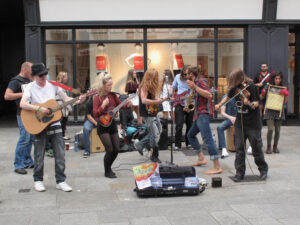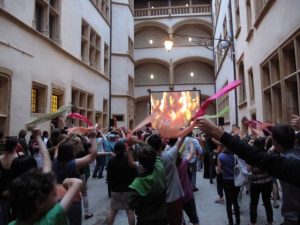Posts Tagged ‘arts’
Elevate Humanity: Support The Arts!
“Squeeee!”
That was my reaction when Julie Nesrallah, the host of Tempo on CBC Radio, said she was about to play Rimsky-Korsakov’s “Scheherazade”.
Scheherazade is one of my favourite pieces of classical music. When it plays, I soar. I am lifted out of myself to float along currents of enchantment.
When I’m driving, as is often the case when I listen to Tempo, this is problematic. My foot tends to press down on the gas pedal the more immersed I become in the music!
This transcendence, this plug-in to bliss, emphasizes the power of art to shape, teach, transform, heal, and comfort. These attributes are what we need more than ever as we all struggle to grapple with the consequences of the global pandemic.

Galway Street Club, Dublin, Ireland, 2016
Our focus as individuals, families, and communities is on surviving. The focus of governments is on managing health systems and restoring economies. However, to ensure the well-being of society and the well-being of each of us, we need to support creative expression. We need to ensure that the arts thrive.
Unfortunately, arts and culture seldom register as a voting issue during election campaigns, such as the one currently underway in British Columbia. When cast alongside health, housing, and jobs, arts and culture drop down the list of priorities as seemingly, relatively trivial.
I understand why that happens and yet I feel the tendency to do so is misguided. Embedding art in all that we do enriches our experiences, enhances our daily lives, and elevates our humanity. As such, it’s critical that we push our political parties to include support for the arts in their platforms and our elected officials to invest in the arts, especially to facilitate the inclusion of the arts in education, in schools and in the curriculum.
To win the argument for the importance of the arts, professional performance arts organizations often deploy and rely on economic arguments to secure sponsorships and donations. It is true that arts organizations function as economic engines. They employ a wide array of people and generate spending in a number of business sectors. As such, this is an important argument to make especially in a world that justifies investments by returns in dollars and cents. In our current times though the pandemic mitigates the effectiveness of such arguments. We need to emphasize, as we always should do, that investing in the arts is about more than the bottom line of tangible, monetary effects.
It is important to note that arguing for government support of the arts is not the same as advocating for state-sponsored culture. The latter is about nourishing the arts and the latter is about promulgating propaganda. That is why support of the arts should not be contingent on government funding alone. The arts will only survive with individual and community support. We each carry a measure of personal responsibility to ensure that artists and arts organizations have the space, time, and resources to flourish and create.
I also believe that the definition of what constitutes art must be inclusive, expansive, and generous. It is not about creating hierarchical preferences for one art form or the other or privileging the art of certain groups and a few voices. For example, people tend to label opera as elitist and yet opera, fundamentally, is about the human voice and the power of the voice does not depend on costumes, sets, and large venues. Some of the most profound experiences I have had with opera have been in intimate gatherings with no staging to distract from the singer’s voice.
Opera is not an elite art form. It is typically available to only a few because professional opera productions are expensive to stage. That is why the survival of opera as an art form in its professional incarnation depends on government, corporate, and individual support. More importantly, it is crucial for opera companies to invite audiences in with programmes that enhance affordability and to venture out to meet audiences with community-based initiatives.
Support for the arts is about elevating horizons and expanding visions. Art in all its forms should never be a privilege which only a few enjoy and it should never be seen as a talent which only a few can exercise. Creative expression is in all of us and it is for all of us. It is a bridge to building community and understanding. It is a celebration of diversity. It is a path to better.
Art is what makes our spirits soar and our hearts sing.
It makes us more than.
Support the arts in these bleak times. Financially if and when you are able to, with your time and attention if you cannot, because that song, that book, that drawing, that moment of creativity captured in whichever art form you enjoy is a spark of hope.
A Song And Its Resonance
There is this song.
I have listened to it obsessively. Usually at night before I turn off the lights. As a remedy, as a tonic, as an anthem for the work I’m doing and the work I hope to do.
I’ve written about music and memory before (see here), but this is different. This is about now and the way this music spurs me on in the current social and political climate.
This song is a spark. A spark that is a component of the antidote we need in these dark times of hate, intolerance, and evil.
It’s from a movie I’ve never watched and perhaps there’s a risk in viewing only one four-minute segment from a feature-length film. This video is also now almost a year old. I only discovered it because of YouTube’s algorithmic operation. The same algorithms that have contributed to so much of the strife and misinformation that contaminate our news and information diets.
The song is from the movie The Greatest Showman. “This Is Me” is sung by Keala Settle who plays Lettie Lutz in the movie (Annie Jones in real life), the Bearded Lady and one of P. T. Barnum’s original nineteenth century cast members. Leaving aside the nature of Barnum’s commercial project and even the commercial project from which this song is drawn, absorb the lyrics as you watch the video.
As much as the words move me, there is magic in the choreography. It’s that magic that pulls me in — every time. That resonates in my heart. The earthiness of the stamping feet, the power of the arms punched into the air, the rhythmic staccato of the bodies swaying. It’s solid, it’s demanding, it’s asserting the right of these bodies to exist as they are in all spaces. In the light, not the dark, in amongst you and me. In amongst us all.
There’s that moment when the performers are suspended in air. They’ve transcended the chains of exclusion and the labels of derision to float above their cares and their worries, but the truth is in the thud of their landing. That landing on two feet. That is when they reclaim their place. The true power of their existence is in the human groundedness of their experience.
And as much as I appreciate the beauty of the production values in this video, the version of the song that I treasure is this one.
Here, Keala Settle is not singing the song from the character’s perspective. As authentically as she might inhabit the character in the film, she is not Lettie Lutz. That is the masquerade.
In the workshop version, Settle embodies the song. She embodies the essence of the words, the heart of the matter. Here, she is singing her life story. She is reliving every struggle, every hurt, every joy, every triumph, and every hope. It’s that uncloaked look into who she is, who she is without adornment or disguise, that opens up the whole performance, hers and that of every other person in the room. You can see it in the ecstatic communion of their spirits and voices.
And the universality in the message of this song, the truth of it, is that we are all different. Our differences do not make us less than any other. They only do so when others associate difference with inferiority, with lack, with less-than.
Unfortunately, it is also a truth that those with power and privilege have gained their rank through a long historical process of magnifying and demonizing difference. Manipulating fear to validate sacrificing others for profit and prestige. For control.
So, there’s a radical — if not revolutionary — message in this song despite the fact that it’s embedded in a cultural artefact that itself is a product of our systems and structures of consumerism and privilege.
And it is this.
I know that there’s a place for us
For we are glorious
Each and every one of us.
And don’t let them, those who benefit from the exploitation of difference, ever tell you differently.
If they do, fight back.
Do not give them a platform to amplify and broadcast hateful messages.
Vote them out.
Unnecessary Movie Audience Restrictions
Hieronymus Bosch. A late-Medieval Dutch painter and an artist whose work intrigues my son.
This month the Vancouver International Film Festival Society (VIFF) is screening a movie about curators preparing an upcoming exhibition of Bosch’s work. How interesting! How cultural! How … wait a minute: what do you mean I can’t take my son to see the film?
It turns out that if a film is unclassified, the regulations prohibit the sale of a ticket to anyone under 19. How absurd! Furthermore, when a film is classified and those under 19 are able to attend, the VIFF theatre concession can no longer serve its adult patrons alcohol. How ridiculous!
So, I’ve written a letter to Minister Oakes urging her to cut this red tape and I will mail it this evening.
If you share my point of view on this, please write the Minister, too.
The more she hears from BC voters, the more likely the government will address these anachronistic provisions, which make a mockery of consumer protection.
September 2, 2016
Honourable Coralee Oakes
Minister of Small Business, Red Tape Reduction
& Responsible for the Liquor Distribution Branch
P.O.Box 9054, STN Prov Govt
Victoria, BC V8W9E2
Dear Minister Oakes,
I had wanted to buy tickets for my family to one of the Vancouver International Film Festival Society (VIFF) screenings of a movie about Hieronymus Bosch, the visionary late-Medieval Dutch painter.
Unfortunately, I’m unable to do so since the movie is unclassified and I cannot buy a ticket for my fifteen year-old son.
My son is an artist and has long been intrigued by Bosch’s work. As his parent, I’m very comfortable in accompanying him to this movie. Its content is cultural, informative, historical, and fascinating. It is in no way a threat to his well-being or his psyche. I think anyone would be hard-pressed to argue that he doesn’t have the maturity necessary to watch this particular film.
In inquiring as to why I was unable to take my son to the movie, I have learned that it is provincial law, not VIFF policy, which demands the classification of films before they can be shown to teenagers. Apparently this law covers only theatrical screenings and DVD releases, but not television nor the internet.
This regulatory policy is based on a logical fallacy that an unclassified film is the same as an unsuitable one. It is a level of red tape that not only hinders operations at VIFF, one of Vancouver’s outstanding cultural institutions, but it also assumes that parents are incapable of determining which movies their teenage children may watch.
The same anachronistic regulations prohibit VIFF from allowing liquor in the theatre on Seymour Street when youth under 19 are present. This seems like an unnecessary duplication of restrictions given that concession staff would be prohibited from serving minors. It also diminishes the experience for older patrons who are denied their full privileges simply because the broader classification of a particular movie expands the audience for that particular screening.
I am writing to ask that you review these particular regulations and amend them at the earliest opportunity. Allow teenagers to attend unclassified movies with their parents’ approval and allow liquor service when a movie audience includes those under 19. That would be an effective red tape reduction and a positive support for small business in the cultural sector.
Thank you Minister Oakes for your consideration of the above. I hope that you will take the measures necessary to introduce a more enlightened approach for screenings of unclassified films in Vancouver, whether at the VIFF theatre or at other locations. Such an approach would facilitate the attendance of teens at film events. It is an approach that will draw in younger audiences, not shut them out and without diminishing the experience of older patrons.
Sincerely yours,
Reema Faris
cc.
Honourable Suzanne Anton, Attorney General & Minister of Justice
Jacqueline Dupuis, Executive Director, VIFF Society
Rob Gialloreto, President & CEO, Consumer Protection BC
To The Graduating Class of 2013
My remarks to the Sentinel Secondary School graduating class of 2013. Another version of this presentation was delivered to the Rockridge graduating class on May 17, 2013. This is a full transcript of my words and as is typical with verbal presentations, adjustments and/or changes may have been made while speaking.
Thank you. Merci.
I’m so pleased to be here tonight. Je suis très heureuse d’être ici avec vous ce soir.
On behalf of the West Van Board of Education, my congratulations to all this year’s graduates. Félicitations!
I know many of you are wondering who is this talking head and why does she get to speak at my grad?
Well, in the November 2011 municipal elections I and four others were elected by West Van residents to serve as Trustees on the Board of Education.
That means my colleagues and I help to oversee the public education system in our community and that along with your teachers, the staff at the school and the district, parents and yourselves, we have a measure of responsibility and accountability for your education from kindergarten through to Grade 12.
I also happen to be a graduate of school district 45.
Even though I’ve been around the District on and off since I was twelve, and even though I’ve been to Sentinel a number of times, I wanted to get a better feel for the school and its students before I spoke tonight.
I phoned up Principal Mike Finch and asked if we could tour the school together. And we did. I got to see some of you at work and some of you at play. I had a look into many of the classrooms and then I asked Mr. Finch to tell me about you, to tell me about students at Sentinel.
I’m just gonna give you a moment to think about what he told me.
No, he didn’t say that. Oh, he’d never say that, would he? No way. Uhuh.
What he did tell me is how impressed he has been by the students at Sentinel. How dedicated you are and how motivated you are to succeed on your own terms whether you’re studying French, pursuing your athletic interests in the academies, or being super achievers.
Barb Sunday, one of your amazing art leaders told me during my visit to the school, that she’d sent off about 50 advanced placement art portfolios for consideration. 50! And if you stop by the Ferry Building Gallery at the foot of 14th Street, you’ll see some of that art on display.
What you’ll also see there is the commitment you’ve made to pursuing your passions and the care you’ve taken to excel in the work you do.
And tonight we’re here to celebrate your accomplishments.
For parents, it’s a bittersweet moment, likely tinged with a sense of relief! Tonight is a chance to celebrate the wonderful individuals you’ve become and yet we also have to be prepared to let you go.
That’s what parents do.
And like parents, the teachers, the administration, and all the staff of the West Van school district – even Trustees, we all have to do our best to make sure you grads have the skills and talents you need to continue to succeed. And now you’re moving on.
But it’s not easy as parents or teachers or administrators to let you go because we know that the journey can sometimes be a challenge.
I would like to share with you some words by the Lebanese poet Kahlil Gibran. In his poem on children, he writes:
Your children are not your children.
They are the sons and daughters of Life’s longing for itself.
They come through you but not from you,
And though they are with you yet they belong not to you.
You may give them your love but not your thoughts,
For they have their own thoughts.
You may house their bodies but not their souls,
For their souls dwell in the house of tomorrow, which you cannot visit, not even in your dreams.
As Gibran says, you, our graduates, you live in tomorrow and we are not here to stand in your way.
You’ve worked hard or maybe you haven’t. You’ve had good days and bad. You’ve made friends, you’ve lost friends. You’ve studied, you’ve learned. You’ve been on a journey and now you’re set for the next stage of life whatever that may be for you.
And what do you need to successfully navigate what’s ahead?
To borrow the words of Canadian musicians David Myles and Classified, you need to embrace your inner ninja.
Be fierce and determined and passionate. Dream big and take action.
Stand up for yourself. More importantly, stand up for others.
Stand up for what you believe. More importantly, be tolerant and allow others to speak up for what they believe.
Stand up for what is right. More importantly, be open to different views and adjust your ideas if warranted.
And finally, Sentinel grads, take all that we — the community, the school District, the administration, your teachers, and your parents — take all that we have given you, take all that you are, and make the world you are inheriting, make it better.
Make the world better for you, for me, and for those who have so much less than either of us.
I know you can do it. I know you can do it.
Thank you and bonne chance!
Friends, Movies, and Memories
I had lunch with friends recently. Our conversation turned to favourite movies and I mentioned Truly, Madly, Deeply starring Juliet Stevenson and Alan Rickman. I also said how tough it was to track down a copy to play at home. The DVD had been discontinued and anything I’d found online was expensive.
Later that day I received an email from my friend: she’d ordered a copy of the movie for me. She didn’t realize it at the time, but the copy she’d tracked down was reasonably priced because it was a VHS tape. Not a problem: I have a working VCR at home.
I first saw Truly, Madly, Deeply when I lived in Toronto (1986-1992). There were any number of cinemas within walking distance of where I lived and a quick subway ride could get me to movie theatres on St. Clair or further north along the Yonge Street corridor.
I went to the movies often during this time and often alone.
Why?

Because when you live on your own, you learn to take yourself out. You can’t always count on having someone there to go with you, whether to a movie or for dinner or to special events. It’s tough to do, especially as a woman, but it’s key to surviving the isolation and loneliness of city life.
I remember enjoying many new releases in Toronto including Disney’s Beauty and the Beast. I was much older than the target demographic but was enticed by the reviews which described Belle as a new-style Disney heroine. She reads!
I saw Thelma and Louise in Toronto although I’m not sure the stranger who sat beside me understood the film given how his hand drifted over during the screening to fondle my thigh.
There were also movies I enjoyed with friends or with visiting family members. Dirty Dancing, Dances with Wolves, Terminator 2 (at the time, the most expensive movie ever made). I also remember going to see Silence of the Lambs (it made me nauseous) and The Princess Bride which had me laughing as much as I’d ever laughed.
Those memories may not be as vivid as they once were, but the stories, the images, the feelings, the impact of that time and those movies have stayed with me.
So as I anticipate the click of the VHS tape in the machine and the whirl of the spools as the tape begins to play, I’m also a little nervous. Will the movie live up to my remembrance of it? Will it move me in the same way as before? Will I go through piles of tissues the way I did when I first saw it?
At the end of the day, it doesn’t matter. I’ll enjoy the film, but the memory I’ll latch on to is that of a friend who went out of her way to help me recapture the magic of a darkened theatre and a brilliantly acted story of love, grief, healing, and life.
Thank you A.E.!
An excerpt from La Muerta (The Dead Woman), a poem by Pablo Neruda, which is recited in Truly, Madly, Deeply
No, forgive me.
If you no longer live,
if you, beloved, my love,
if you have died,
all the leaves will fall in my breast,
it will rain on my soul night and day,
the snow will burn my heart,
I shall walk with frost and fire and death and snow,
my feet will want to walk to where you are sleeping, but
I shall stay alive …

